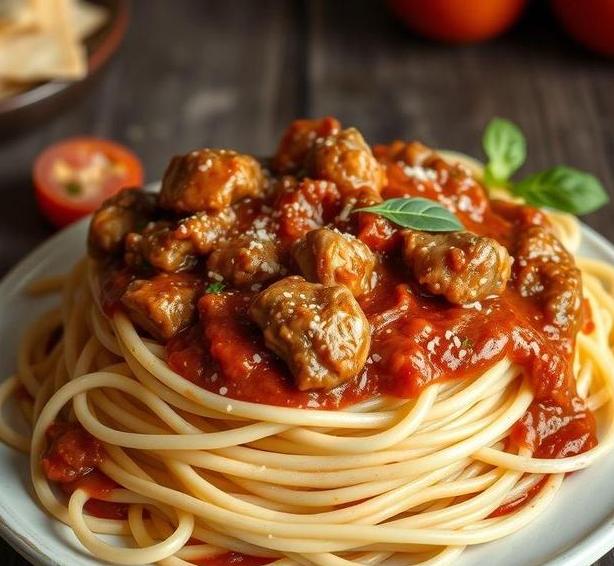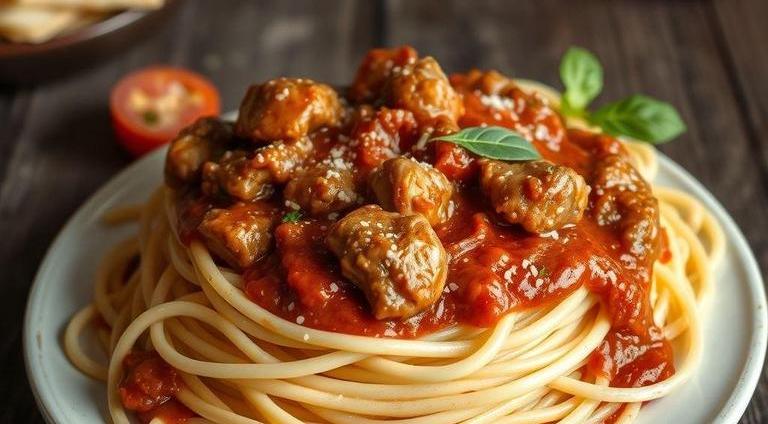Spaghetti sauce with meat-whether it’s made with ground beef, sausage, or any other hearty meat-adds richness and depth to the simplest pasta dishes. But like any cooked food, it’s important to understand how to properly store it to ensure that it remains fresh, safe to eat, and flavorful. You’ve probably asked yourself at some point: Can spaghetti sauce with meat go bad?
The short answer is yes, it absolutely can. While spaghetti sauce with meat may seem like it could last forever in the fridge or pantry, like all perishable foods, its quality deteriorates over time. Spoiled spaghetti sauce can lead to foodborne illness, and you don’t want to take any chances when it comes to your health.
In this guide, we’ll dive into all the details about the shelf life of spaghetti sauce with meat, how to spot if it’s gone bad, and most importantly, how to store it correctly to keep your sauce fresh for as long as possible.
Can Spaghetti Sauce With Meat Go Bad?
Absolutely, spaghetti sauce with meat can go bad, and it’s important to be aware of how to store it properly to avoid any issues. Like other cooked sauces or meats, spaghetti sauce with meat contains water and proteins that provide an environment where bacteria can grow over time if it’s not stored properly. Once the sauce starts to spoil, you’ll notice changes in texture, smell, and even taste, which can all signal potential risks.
The problem arises when the sauce is left out too long, exposed to air, or not stored at the right temperature. That’s why it’s critical to understand how long it will last, what signs to look for, and how to keep it in the best possible condition.
Shelf Life For Spaghetti Sauce With Meat

How long does spaghetti sauce with meat last? It depends on several factors, such as how it’s stored, whether it’s homemade or store-bought, and the specific ingredients in it. Let’s break it down for both homemade and store-bought sauces.
Homemade Spaghetti Sauce With Meat
- In the fridge: Homemade spaghetti sauce with meat typically lasts about 3-4 days in the fridge. Since there’s no preservative to extend its shelf life, it’s best to use it up within a few days.
- In the freezer: If you have leftovers that you don’t plan on eating right away, the freezer is your friend. Homemade spaghetti sauce with meat can last in the freezer for about 3-4 months. Just make sure to store it in an airtight container or freezer-safe bag to prevent freezer burn.
Store-Bought Spaghetti Sauce With Meat
- Unopened jars: If the sauce is unopened, you can usually keep it in the pantry for about 6-12 months, depending on the expiration date printed on the jar. Once you open the jar, however, the shelf life dramatically decreases.
- Opened jars: After opening, store-bought spaghetti sauce with meat typically lasts about 5-7 days in the fridge. This can vary slightly depending on the brand and whether the sauce contains preservatives or not.
The key takeaway here: Always check the labels on store-bought sauces and make sure to follow the guidelines. For homemade sauce, freezing is your best bet to prolong freshness.
Common Signs Of Spoilage
Now that you know the shelf life, it’s important to recognize when your spaghetti sauce with meat has gone bad. Spoiled sauce can look, smell, and taste pretty unappetizing, and there are a few clear signs you can watch out for:
Change In Color
- What to look for: If the sauce has turned an unusual color (e.g., darkened or started to mold), it’s a good sign it has gone bad. Meat in the sauce can sometimes change color too, going from brown to an off-gray or greenish hue.
Off Or Sour Smell
- What to look for: Spaghetti sauce with meat should have a familiar, savory smell. If it starts to smell sour, rancid, or ’off’ in any way, that’s a red flag. Meat that’s gone bad often smells foul, like rotting or metallic, and the sauce will take on that unpleasant odor.
Strange Texture
- What to look for: If the sauce has developed a slimy or sticky texture, this is a sign of spoilage. Meat in the sauce, in particular, will develop a mushy texture as it deteriorates, and this can also affect the overall sauce consistency.
Taste
- What to look for: If the sauce tastes tangy in a bad way, it’s likely gone sour due to fermentation. Trust your taste buds-if the sauce doesn’t taste right, it’s best to toss it.
Mold
- What to look for: If you spot any mold growing on the surface or inside the container, it’s time to dispose of the sauce. Mold can develop if the sauce has been stored improperly, or if it’s been exposed to air for too long.
How To Store Spaghetti Sauce With Meat?

Proper storage is your first line of defense against spoilage. By taking a few simple steps, you can extend the life of your spaghetti sauce with meat and keep it tasting fresh.
Refrigeration After Cooking
- Once your homemade spaghetti sauce with meat has cooled down, transfer it to an airtight container and place it in the fridge. The key here is to cool the sauce to room temperature before refrigerating it to prevent condensation from creating an environment conducive to bacterial growth.
- For store-bought sauce, once opened, transfer any unused sauce into a sealed container (if it didn’t come with a resealable lid) and refrigerate promptly.
Freezing Leftovers
- For homemade sauce: You can freeze spaghetti sauce with meat in freezer-safe bags or airtight containers for later use. Be sure to leave some room for expansion as the sauce freezes. Label your containers with the date to ensure you use it within the recommended 3-4 months.
- For store-bought sauce: Once opened, store any leftovers in an airtight container and freeze them. It may lose some texture once thawed, but the flavor should still be good.
Avoid Leaving It Out
- Don’t leave spaghetti sauce with meat sitting out at room temperature for more than two hours. Bacteria grow quickly at room temperature, and meat sauces are especially vulnerable to spoilage. If your sauce has been sitting out longer than that, it’s safer to discard it.
Expert Tips
To keep your spaghetti sauce with meat in top condition and prevent spoilage:
- Use Glass Containers: When storing your sauce, consider using glass containers instead of plastic. Glass doesn’t absorb odors or stain, and it provides a better seal, keeping your sauce fresher for longer.
- Avoid Cross-Contamination: Always use clean utensils when serving your sauce, and avoid double-dipping, as this introduces bacteria that can cause the sauce to spoil more quickly.
- Reheat Properly: When reheating spaghetti sauce with meat, bring it to a full boil to kill off any potential bacteria. Stir occasionally to ensure even heating.
- Freeze in Small Portions: If you freeze spaghetti sauce, consider portioning it into smaller containers. This way, you can thaw just the amount you need, without having to defrost the entire batch.
FAQs
How Long Can Spaghetti Sauce With Meat Last In The Fridge?
Spaghetti sauce with meat can last up to 3-4 days in the refrigerator if stored in an airtight container. It’s important to refrigerate the sauce promptly after it cools to prevent bacterial growth.
Can Spaghetti Sauce With Meat Go Bad If Left Out Overnight?
Yes, spaghetti sauce with meat can go bad if left out at room temperature for more than 2 hours. After this time, bacteria can multiply rapidly, increasing the risk of foodborne illness.
How Can I Tell If Spaghetti Sauce With Meat Has Gone Bad?
Signs that spaghetti sauce with meat has gone bad include an off or sour odor, discoloration, mold growth, and a slimy texture. If any of these are present, it’s best to discard the sauce.
Can Spaghetti Sauce With Meat Be Frozen?
Yes, spaghetti sauce with meat can be frozen for up to 3-4 months. To freeze, place the sauce in an airtight container or freezer-safe bag, leaving some space for expansion.
Does The Meat In Spaghetti Sauce Affect How Long It Lasts?
Yes, the meat in spaghetti sauce can cause it to spoil faster compared to a vegetarian sauce. Meat provides nutrients that bacteria can thrive on, reducing the sauce’s shelf life.
How Can I Store Spaghetti Sauce With Meat To Make It Last Longer?
To extend the shelf life, store spaghetti sauce with meat in an airtight container in the fridge or freezer. If freezing, portion the sauce into smaller servings to ensure you only thaw what you need.
Can Spaghetti Sauce With Meat Be Reheated Multiple Times?
It’s not recommended to reheat spaghetti sauce with meat more than once. Repeated heating can increase the risk of bacterial contamination and degrade the sauce’s texture and flavor.
Can You Eat Spaghetti Sauce With Meat After The Expiration Date?
It’s not safe to eat spaghetti sauce with meat after its expiration date, especially if it has been stored improperly. Always check for signs of spoilage, even if the sauce is within the date range.
Is It Safe To Eat Leftover Spaghetti Sauce With Meat If It’s Been In The Fridge For 5 Days?
If the spaghetti sauce with meat has been in the fridge for 5 days, it may no longer be safe to eat. While refrigeration slows spoilage, it is best to consume it within 3-4 days to ensure safety.
What Temperature Should Spaghetti Sauce With Meat Be Stored At To Avoid Spoiling?
Spaghetti sauce with meat should be stored at or below 40°F (4°C) in the fridge to avoid spoiling. Freezing should occur at 0°F (-18°C) for long-term storage.